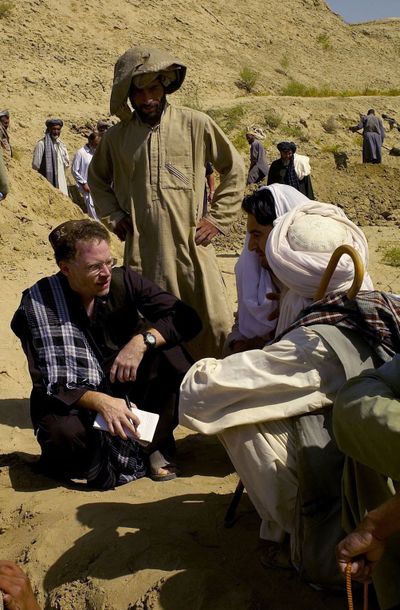NYT: Reporter escaped captors
David Rohde spent more than half a year in Taliban custody

KABUL – A New York Times reporter known for making investigative trips deep inside dangerous conflict zones escaped from militant captors after more than seven months in captivity in Afghanistan and Pakistan by climbing over a wall, the newspaper said Saturday.
David S. Rohde was abducted Nov. 10 along with an Afghan reporter colleague and a driver south of the Afghan capital, Kabul. He had been traveling through Logar province to interview a Taliban commander, but was apparently intercepted and taken by other militants on the way.
The Times reported that Rohde and Afghan reporter Tahir Ludin on Friday climbed over the wall of a compound where they were held captive in the North Waziristan region of Pakistan.
The two then found a Pakistani army scout, who led them to a nearby base, the Times said. On Saturday, the two were flown to the U.S. military base in Bagram, the Times reported.
A U.S. military spokeswoman, Lt. Cmdr. Christine Sidenstricker, said the military had not been involved. She could not say whether the State Department or CIA had flown the two to the military facility.
Rohde, reported to be in good health, said his driver remained with their captors.
In Washington, White House press secretary Robert Gibbs said the U.S. is “very pleased” that Rohde is safe and returning home. He said the escape “marks the end of a long and difficult ordeal.”
Afghan officials confirmed the kidnapping in the days after the abduction, but the Associated Press and most other Western news outlets respected a request from the Times not to report on the abductions because the publicity could negatively affect hostage rescue efforts and imperil Rohde’s life.
The Times said there had been “sporadic communication” from Rohde and his kidnappers during the last seven months but that no ransom money had been paid.
Kristen Mulvihill, Rohde’s wife, told the Times that the two had been married for nine months, “and seven of those David has been in captivity.” She thanked the Times, the U.S. government and “all the others” who helped the family during the kidnapping.
The FBI said in a statement that it had been investigating Rohde’s kidnapping, working closely with the Times and Rohde’s family. It said Rohde contacted family members Friday to tell them he had escaped. The FBI said it was working with the U.S. State and Defense departments to see that he receives medical attention and is reunited with his family.
Rohde was on leave from the Times when he was taken. He had traveled to Afghanistan to work on a book about the history of American involvement in Afghanistan when he went to Logar to interview a Taliban commander. Before setting out, he notified the Times’ bureau in Kabul on whom to notify if he did not return, the Times said.
Logar province, where Rohde was seized, has seen an influx of militants over the last two years. Residents last year said the government had little control outside the provincial capital and that Taliban and other militants frequently set up checkpoints on highways.
In January, the U.S. military deployed more than 3,000 troops to Logar and neighboring Wardak to combat the insurgent safe havens near Kabul’s doorstep.
It was not clear who took Rohde captive, and the Times did not reveal his abductors. Logar province has militants loyal to Taliban leader Mullah Omar but also to renegade warlord Siraj Haqqani, whom the U.S. has accused of masterminding beheadings and suicide bombings.
Violence has risen steadily across Afghanistan over the last three years, and Rohde was taken during a period when attacks against Westerners spiked. A Canadian journalist, Mellissa Fung, was kidnapped in Kabul and a Dutch reporter was taken just outside Kabul around the time Rohde was abducted. Both were released within a month.
The militants who kidnapped Rohde transferred him about 100 miles southeast to Pakistan’s North Waziristan region.
Rohde’s father, Harvey Rohde, told the Times that he regretted that his son had made the trip but that he understood his motivation “to get both sides of the story, to have his book honestly portray not just the one side but the other side as well.”